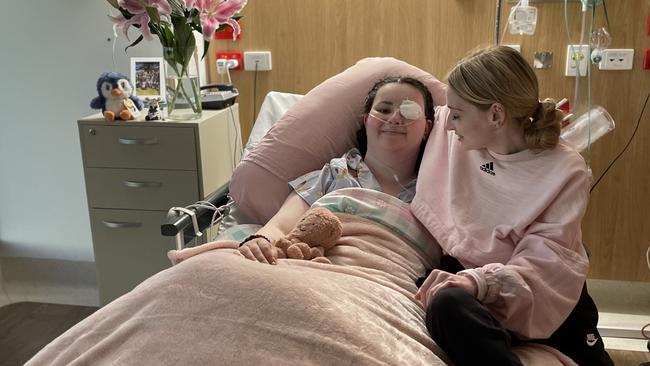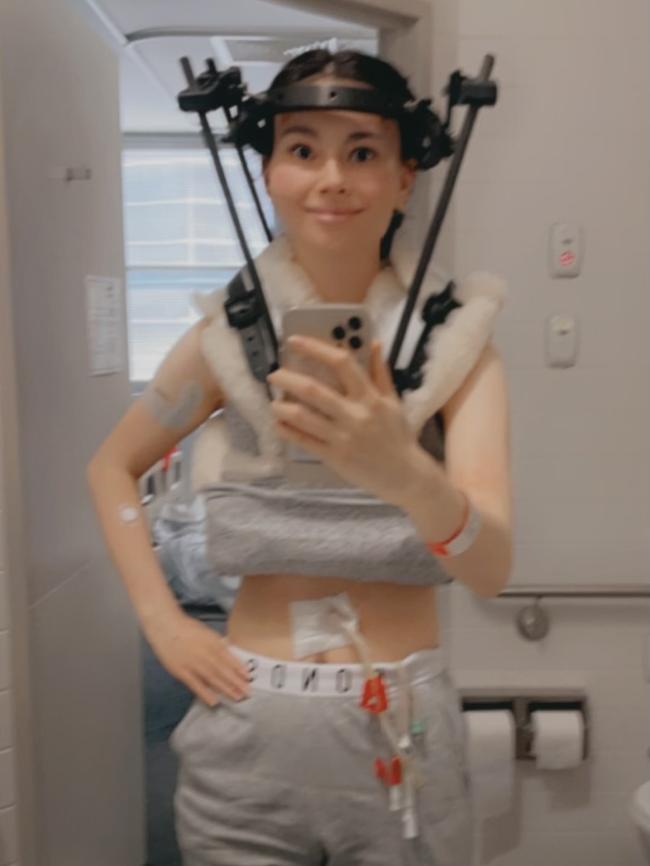Lily Thai, 23, hopes to find peace and freedom in voluntary assisted dying
On Wednesday, Lily Thai will die. Here, she explains why she’ll be using voluntary assisted dying laws to finally find peace.

SA News
Don't miss out on the headlines from SA News. Followed categories will be added to My News.
Lily Thai will be departing from this life on Wednesday – a decision she’s made to free herself from her body aged just 23.
Crippled with illness and pain for most of her young life, she hopes to finally find peace and freedom in self-imposed death.
She will use voluntary assisted dying laws, legalised in South Australia since January 31, 2023, having signed the final paperwork last week.
This year, she realised she could no longer continue with the physically painful journey ahead, having relied on her father to do everything for her.
“I realised that I can’t have any more anaesthesia, so I (couldn’t) have any more feeding tube changes (or) surgeries,” she said.
“I decided that pain was so severe it wasn’t worth it, and I just wanted to take it into my own hands.”


As a teenager, Lily had experienced many health issues and at 17 years old, she was formally diagnosed with Ehlers Danlos Syndrome (EDS) – a disorder that mainly affects the joints, skin and walls of the blood vessels.
Yet nothing could have prepared her for the confronting reality that she would later plan her own funeral before saying goodbye to loved ones, after opting for voluntary assisted dying.
It was a decision too difficult for her mother to bear, who could not be present in the room as her only child formally signed the consent form.
In 2018, a year after her EDS diagnoses, she caught a severe upper respiratory infection and lost her ability to “walk, use her bowels, eat and/or drink without being sick”.
She initially thought her health deterioration was caused by a spinal fluid leak, but after undergoing treatment to fix it, her condition never improved and doctors were unable to give her a definitive diagnosis.
By 2021, Ms Thai argues doctors in Adelaide “never believed her,” and told her she was “making it up and doing it for attention”.

As a desperate last measure, she travelled to Sydney to meet a surgeon who “specialised in spinal issues (for) patients with EDS”.
By then, she was confined to a halo brace and required a nasal feeding tubebecause she “couldn’t keep anything down,” and weighed around 40 kgs.
Relief came after she was finally able to receive treatment from an “amazing” team of doctors at Sydney’s Macquarie University Hospital.
In May 2021, she had spinal fusion surgery and, a week later, was fitted with a gastro jejenul tube to vent out stomach acid and secretion, then spent a few weeks in rehabilitation.
During her rehab, hospitals were under strict Covid-19 protocols, which left Lily to endure the experience alone without the comfort of visitors. “I couldn’t stand not seeing my dad, so I got discharged early,” she said.
Lily says she was later referred to a neuroimmunologist in Sydney, who diagnosed her with auto-immune autonomic ganglionopathy – a rare condition, where the body’s immune system attacks the nervous system.
“The neurologist said that I was in multi-organ failure, but it wasn’t until I had a severe decline after one of my surgeries, (and) when I saw my rehab doctor they found a large lesion of the left side of my brain,” she said. “He suspected I had a type of motor neurone disease.”

On November 25, 2021 – Lily’s 22nd birthday – she returned to Adelaide, crippled with the heartbreaking reality that her body would soon fail her, and she had no control.
Now spending her final days at Flinders Medical Centre (FMC), Lily said most of her days are mainly filled with sleep to avoid being in “excruciating pain.”
She said was “just surviving,” but her newly found friendship with Annaliese Holland, 23, - who is also diagnosed with AAG and stays at FMC - has made her hospice experience more meaningful.
They connected after Annaliese shared her story with The Advertiser earlier this month.
The pair explained young people with a terminally illness often mourn the “life (they) never got to have.”
“For elderly or older people, (they) have memories to look back on to laugh about and cry about,” Annaliese said. “But for a young person in palliative hospice, you haven’t formed many of them.”
“You never do the normal things like going to your high school graduation,” Lily said.
“What makes me sad is that … you just want to push on, but at the same time it’s really hard because you know you won’t have babies or any of that,” Annaliese said.
Annaliese said she’s doing everything in her power to make Lily’s last days in hospice more bearable.
“All I can do is brush her (Lily’s) hair or moisturise her legs. I just want her to know that I’m there and people care,” Annaliese said, crying gently.

Lily said the gruelling health journey “has not been easy” for her family, with despairing emotions intensifying last week, as she signed the final paperwork.
“Mum (had) to step out of the room, because she found it too much, but they respect my decision, and they’d rather not see me suffer anymore,” she tearfully said.
On Wednesday, doctors will administer an IV medication that will terminate Lily’s life within 10 seconds.
“I feel pretty numb. I know how hard it will be for my family and friends,” she said, in tears.
“But it’s gotten to the place that I’ve lost control of everything else in my life and I’ve been reliant on my dad as a caregiver to do everything for me, even the most intimate things.”
Lily has made peace with the “hard and confronting” decision. “It’s now my time to choose what is right for me. I’ve been given a choice, and that is to die peacefully,” she said.
“I’ll no longer have any pain, I will no longer suffer with any of these issues, and I’ll finally be free of all the suffering that I have endured for so many years,” she said.
Lily has been able to plan “aspects of her funeral” and has been saying goodbye to family and friends.
“We’ve got a lovely place to be buried for me,” she said. “It’s been really beautiful seeing everything and telling my family how much they mean to me.”
Following her passing, Lily said she’ll miss “everything,” and has written heartfelt letters to her loved ones with reminders of all “the things (they’ve) done in life together.”
As part of her legacy, in lieu of flowers, she’s inviting donations for palliative research to The Hospital Research Foundation on her memorial card, which will be given to funeral attendees.
Lily hopes she will be remembered by a “very colourful (palliative) hospital dedicated to younger people.”
A spokesperson from SA Health said, “voluntary Assisted Dying has been available in South Australia since 31 January 2023”.
“Safe, accessible and compassionate voluntary assisted dying gives eligible South Australians with a terminal illness choice at the end of life,” the spokesperson said. “Anyone who takes part in the voluntary assisted dying pathway can withdraw at any stage of the process.”
More Coverage
Originally published as Lily Thai, 23, hopes to find peace and freedom in voluntary assisted dying





